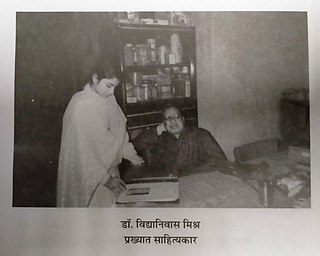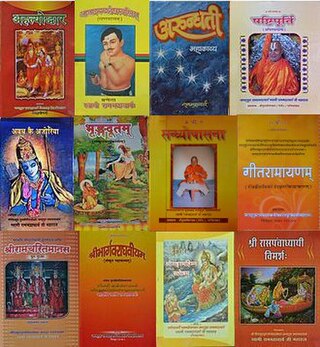Related Research Articles

Gopinath Kaviraj was an Indian Sanskrit scholar, Indologist and philosopher. First appointed in 1914 a librarian, he was the Principal of Government Sanskrit College, Varanasi from 1923 to 1937. He was also the editor of the Sarasvati Bhavana Granthamala during that period.

Mahatma Gandhi Kashi Vidyapith is a public university located in Varanasi, Uttar Pradesh, India. Established in 10 February 1921 as Kashi Vidyapith and later renamed, it is administered under the state legislature of the government of Uttar Pradesh. It got University status in 1974 as Deemed to be University and State University status in 2009 by The Uttar Pradesh State Universities (Amendment) Act, 2008. The university has more than 400+ affiliated colleges spread over six districts. It is one of the largest state universities in Uttar Pradesh, with hundreds of thousands of students, both rural and urban. It offers a range of professional and academic courses in arts, science, commerce, agriculture science, law, computing and management.

Vidya Niwas Mishra was an Indian scholar, a Hindi-Sanskrit littérateur, and a journalist. He was honoured with Padma Bhushan.

Satya Vrat Shastri was an Indian Sanskrit scholar, writer, grammarian and poet. He wrote three Mahakavyas, three Khandakavyas, one Prabandhakavyas and one Patrakavya and five works in critical writing in Sanskrit. His important works are Ramakirtimahakavyam, Brahattaram Bharatam, Sribodhisattvacharitam, Vaidika Vyakarana, Sarmanyadesah Sutram Vibhati, and "Discovery of Sanskrit Treasures" in seven volumes.

Sampurnanand Sanskrit Vishwavidyalaya is an Indian university and institution of higher learning located in Varanasi, Uttar Pradesh. It is one of the largest Sanskrit universities in the world. Currently university offers a range of undergraduate and postgraduate programs in various disciplines. The university has been accredited by NAAC and recognized by UGC.

Bhagirath Prasad Tripathi, better known as Vagish Shastri, was an Indian Sanskrit grammarian, linguist, tantra and yogi. In 2018, Government of India awarded him the fourth highest civilian award Padma Shri for his work in the field of literature and education.
Baldev Upadhyaya was a Hindi and Sanskrit scholar, literary historian, essayist and critic. He wrote numerous books, collections of essays and a historical outline of Sanskrit literature. He is noted for discussing Sanskrit literature in the Hindi language. Earlier books related to Sanskrit literature were often written either in Sanskrit or in English.
Ram Karan Sharma was a Sanskrit poet and scholar. He was born in 1927, in Shivapur in the Saran district of Bihar.

Devarshi Kala Nath Shastry was born on 15 July 1936. He is a Sanskrit scholar and was honoured by the President of India in 1988. He is an Indologist and a prolific writer in Sanskrit, Hindi and English, and a well-known linguist, who has contributed to the campaign of evolving technical terminology in Indian languages and ensuring a respectable status for Hindi, the official language of his state and the Indian union.

Vishwanathan Venkatachalam was an eminent Sanskrit scholar. He served as the vice-chancellor of Sampurnanand Sanskrit University, Varanasi, India for two terms. He was awarded the Padma Shri in 1989 by the Government of India for his valuable contribution to the field of Sanskrit research and education.

Jagadguru Ramanandacharya Swami Rambhadracharya is an Indian Hindu spiritual leader, educator, Sanskrit scholar, polyglot, poet, author, textual commentator, philosopher, composer, singer, playwright and Katha artist based in Chitrakoot, India. He is one of four incumbent Jagadguru Ramanandacharya, and has held this title since 1988.

Rewa Prasad Dwivedi was a Sanskrit scholar, poet, writer, teacher, and critic. His original works include poetry as epics and lyrics, plays, and prose. He wrote the new literature under the pseudonym "sanatana", meaning 'the eternal'. He is also known as 'Acharya' Dwivedi.
Abhiraj Rajendra Mishra is a Sanskrit author, poet, lyricist, playwright and a former Vice-Chancellor of the Sampurnanand Sanskrit University, Varanasi.

Jagadguru Rambhadracharya is a Hindu religious leader, Sanskrit scholar and Katha artist based in Chitrakoot, India. His works consist of poems, commentaries, plays and musical compositions of his works, etc. He has authored more than 250 books and 50 papers, including four epic poems, a Hindi commentary on Tulsidas' Ramcharitmanas, and Sanskrit commentaries on the Ashtadhyayi and the Prasthanatrayi scriptures. Various audio and video recordings o his works have also been released. He writes in Sanskrit, Hindi, Awadhi, Maithili, and several other languages.

This timeline lists important events relevant to the life of the Vaishnava (Hindu) spiritual leader, poet, commentator, educationist, religious and social figure Rambhadracharya.

Jagadguru Ramanandacharya Swami Rambhadracharya is a Hindu religious leader, Sanskrit scholar and Katha artist based in Chitrakoot, India. Rambhadracharya is a spontaneous poet and writer in Sanskrit, Hindi, Awadhi, Maithili, and several other languages. He has authored more than 100 books and 50 papers, including four epic poems, a Hindi commentary on Tulsidas' Ramcharitmanas, a Sanskrit commentary in verse on the Ashtadhyayi, and Sanskrit commentaries on the Prasthanatrayi scriptures. He is regarded as one of the greatest authorities on Tulsidas in India, and is the editor of a critical edition of the Ramcharitmanas.
Rahas Bihari Dwivedi is a Sanskrit scholar and poet from Jabalpur, Madhya Pradesh. He was awarded the President's Ceritificate of Honour for Sanskrit in the year 2012. He was the formerly the Head of the Department of Sanskrit at Rani Durgavati University, Jabalpur.

Bhatt Mathuranath Shastri was an eminent Indian Sanskrit scholar, poet, philosopher, grammarian, polyglot and expert of Tantra from Jaipur, Rajasthan. He was one of the prominent Sanskrit writers of the twentieth century who wrote on both traditional and modern themes. He pioneered the use of several new genres in Sanskrit literature, writing radio plays, essays, travelogues, and short stories. He wrote many songs in Sanskrit including Ghazals, Thumris, Dadras and Dhrupads. He pioneered the use of Prakrit metres in Sanskrit poetry.

Vishnu Raj Atreya was a Nepali writer and poet, who wrote in Nepali language, Sanskrit language and Awadhi language. He used the title Latosaathi in his poetry works since 1963 A.D. He is considered to be the first person to start writing Haiku in Sanskrit language.
References
- 1 2 3 4 Tripathi (ed.) 2012, pp. 291–292.
- 1 2 3 4 Lal 2006, pp. 4158–4159.
- 1 2 "Akademi Awards Information". Sahitya Akademi . Retrieved 19 October 2012.
- 1 2 3 4 5 6 7 8 9 10 11 12 13 14 Singh and Baruah 2004, pp. 1473-1475.
- 1 2 3 Dalal 2011, p. 384.
- ↑ Singh and Baruah 2004, pp. 1448-1450.
- 1 2 Raja, K. Kunjunni (1990). Coward, Harold G.; Potter, Karl H (eds.). Encyclopedia of Indian Philosophies: The philosophy of the grammarians, Volume 5. New Delhi, India: Motilal Banarsidass. p. 324. ISBN 9788120804265.
- ↑ Mishra, Jagadish Prasad (1987). Āśādharabhaṭṭa: the contribution of Āśādhara Bhaṭṭa to Saṃskrit poetics. New Delhi, India: Eastern Book Linkers. p. 7.